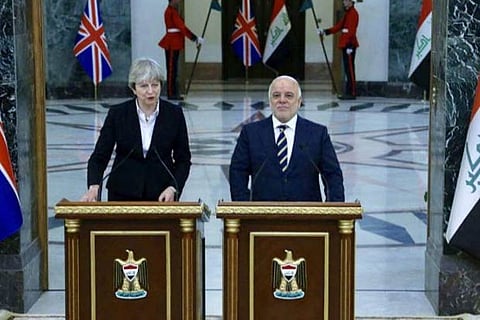

Baghdad
Britain is a main partner in the US-led coalition helping Iraq defeat Islamic State, the hard-line Sunni group that overran about a third of Iraq in 2014.
The British government said in September that there were around 600 British soldiers on the ground in Iraq.
They are primarily involved in training Iraqi security forces in battle-winning infantry, engineering and combat medical techniques, as well as providing courses on other skills including countering improvised explosive devices.
Britain provided over 1,400 military personnel as part of its three-year involvement in the US-led coalition.
“Iraqi-British relations are witnessing a marked improvement. We thank the British government for its support of Iraq in all fields, chiefly cooperation against terrorism, air support, and intelligence,” Abadi said in a news conference.
Britain had also helped Iraq on the issue of those who were internally displaced as a result of the Islamic State takeover and the subsequent campaign by Iraqi forces to dislodge the militants, he said.
“We will continue to support Iraq as a partner in order to enforce security, building, and stability, as well as in training Iraqi forces and efforts to return the displaced,” Abadi’s office quoted May as saying.
The two leaders discussed British investments in Iraq. May pledged in a news conference to provide 20 million pounds ($26.8 million) in support of human rights and 30 million towards stabilisation efforts and reforms.
Britain agreed in March to arrange 10 billion pounds in loans to finance infrastructure projects in Iraq over a 10-year period, a program that would only benefit British companies.
May “affirmed her support for Iraq’s unity” and called on the Kurdistan Regional Government (KRG) to “respect a united Iraq in all fields,” Abadi’s office said in a statement.
She said in a news conference, through a translator, that she wanted to see “a united and inclusive Iraq”.
Iraq’s Kurds voted overwhelmingly to break away from Iraq in a September 25 referendum, defying the central government in Baghdad and alarming neighbouring Turkey and Iran who have their own Kurdish minorities.
The Iraqi government responded by seizing the Kurdish-held city of Kirkuk and other territory disputed between the Kurds and the central government. It also banned direct flights to Kurdistan and demanded control over border crossings.
Long-serving Kurdish president Masoud Barzani stepped down over the affair and the regional government led by his nephew Prime Minister Nechirvan Barzani has tried to negotiate an end to the confrontation.
A KRG spokesman told Reuters there were no plans for May to visit the region’s capital Erbil.
Visit news.dtnext.in to explore our interactive epaper!
Download the DT Next app for more exciting features!
Click here for iOS
Click here for Android